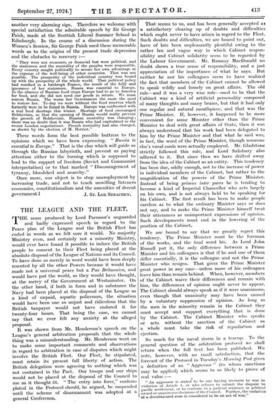THE LEAGUE AND THE FLEET.
THE scare produced by Lord Parmoor's unguarded and badly expressed speech in regard to the Peace plan of the League and the British Fleet has ended in words as we felt sure it would. No majority Ministry even, and certainly not a minority Ministry, would ever have found it possible to induce the British people to consent to their Fleet being placed at the absolute disposal of the League of Nations and its Council. To have done so merely in word would have been deeply resented by all the other Powers because it would have made not a universal peace but a Pax Britannica, and would have put the world, as they would have thought, at the mercy of the Government at Westminster. On the other hand, if both in form and in substance the Navy had been placed at the disposal of the League as a kind of unpaid, aquatic policeman, the situation would have been one so unjust and ridiculous that the British taxpayer would not have endured it for twenty-four hours. That being the case, we cannot say that we ever felt any anxiety at the alleged proposal. It was shown from Mr. Henderson's speech on the League's general arbitration proposals that the whole thing was a misunderstanding. Mr. Henderson went on to make some important comments and observations in regard to arbitration in case of disputes which might involve the British Fleet. Our Fleet, he stipulated, must retain its present full liberty. of action. The British delegation were agreeing to nothing which was not contained in the Pact. Our troops and our ships would not be placed at the disposal of the Council to use as it thought fit. " The entry into force," contem- plated in the Protocol should, he argued, be suspended until the scheme of disarmament was adopted at a general Conference. That seems to us, and has been generally accepted as a satisfactory clearing up of doubts and difficulties which ought never to have arisen in regard to the Fleet. Such doubts and difficulties, we are bound to point out, have of late been unpleasantly plentiful owing to the rather lax and vague way in which Cabinet respon- sibility and Cabinet solidarity seem to be regarded by the Labour Government. Mr. Ramsay MacDonald no doubt shows a true sense of responsibility, and a just appreciation of the importance of what he says. But neither he nor his colleagues seem to have realized the fact that members of the Cabinet cannot be allowed to speak wildly and loosely on great affairs. The old rule—and it was a very wise rule---used to be that the Cabinet was a kind of artificial personality composed of many thoughts and many brains, but that it had. only one regular and natural mouthpiece, and that was the Prime Minister. If, however, it happened to be more convenient for some Minister other than the Prime Minister to deal with great affairs of State, then it was always understood that his work had been delegated to him by the Prime Minister and that what he said was, in fact, the word of the Prime Minister, though someone else's vocal cords were actually employed. Mr. Gladstone strictly followed this rule, and Lord Salisbury also adhered to it. But since then we have drifted away from the idea of the Cabinet as an entity. This tendency has been due, oddly enough, not to the increase of power in individual members of the Cabinet, but rather to the magnification of the powers of the Prime Minister. Instead of being primus inter pares he is tending to become a kind of Imperial Chancellor who acts largely on his own, and is not always held to be speaking for his Cabinet. The first result has been to make people careless as to what the ordinary Minister says or does not say, and to make the Prime Minister himself treat their utterances as unimportant expressions of opinion. Such developments must end in the lowering of the position of the Cabinet.
We are bound to say that we greatly regret this tendency. The Prime Minister must be the foreman of the works, and the final word his. As Lord John Russell put it, the only difference between a Prime Minister and his colleagues is that if he and one of them differ essentially, it is the colleague and not the Prime Minister who resigns. That gives the Prime Minister great power in any case—unless more of his colleagues leave him than remain behind. When, however, members of the Cabinet waive their differences and remain with him, the differences of opinion ought never to appear. The Cabinet should always speak as if it were unanimous, even though that unanimity may have been caused by a voluntary suppression of opinion. As long as the men in the minority remain in the Cabinet they must accept and support everything that is done by the Cabinet. The Cabinet Minister who speaks or acts without the sanction of the Cabinet as a whole must take the risk of repudiation and ejection.
So much for the naval storm in a teacup. To the general question of the arbitration protocol we shall return when the full text has been published. We note, however, with no small satisfaction, that the forecast of the Protocol in Tuesday's Morning Post gives a definition of an " Aggressor " (to whom sanctions may be applied) which seems to us likely to prove of real value :- " An aggressor is stated to be ono having recourse to war in violation of Article 1, or who refuses to submit the dispute to pacific settlement, or to conform to a judicial sentence or arbitral award or unanimous decisions of the Council. Further, the violation of a demilitarized zone is considered to be an act of war."






































 Previous page
Previous page